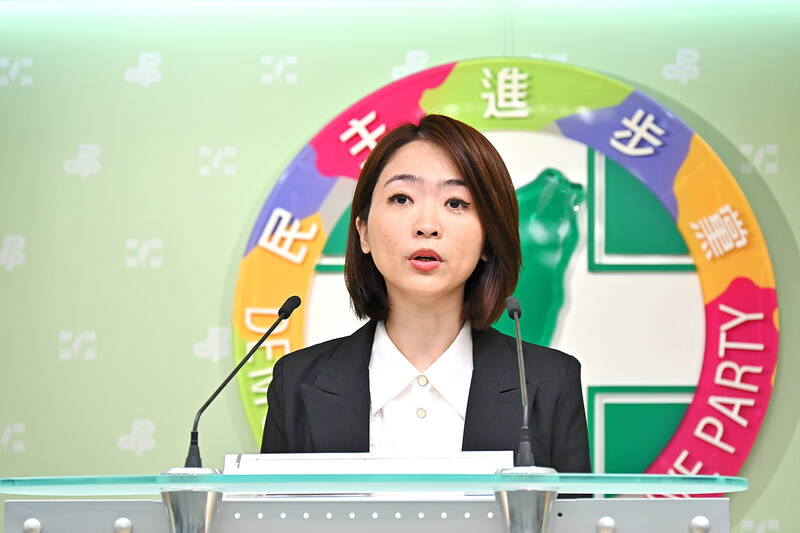Taiwan welcomes the lifting of an import ban on pomelos by China, but when Beijing uses the move to create division, it does not help promote mutual trust nor boost trade, President William Lai (賴清德) said at the weekly meeting of the Democratic Progressive Party’s Central Standing Committee (DPP) yesterday.
Lai was referring to a statement last week by China’s Taiwan Affairs Office giving the go-ahead for imports of Taiwanese pomelos, the main fruit associated with the Mid-Autumn Festival, which falls on Tuesday next week.
Although the move is welcome, China would only allow imports from 16 pomelo producers in Hualien County, DPP spokeswoman Han Ying (韓瑩) quoted Lai as saying

Photo: Tu Chien-rong, Taipei Times
China imposed a ban on Taiwanese citrus fruits, including pomelos, in August 2022.
Moreover, China did not follow the conditions set by both sides in the past, including that the products go through a certified platform for inspection and quarantine, that the Taiwanese government agency in charge of agricultural products be consulted first, that a communication platform be set up, and that inspections and testings be based on scientific criteria, Lai said.
Taiwan wants progress on cross-strait relations, but it must be done on the condition of “mutual respect” and “equal status,” he said.
However, “China is using specific trade or businesses to create division in society,” Lai said. “This would have a negative effect on establishing mutual respect. Neither would it promote regional stability and economic prosperity.”
Lai also welcomed the US House of Representatives unanimously passing the Taiwan Conflict Deterrence Act, which aims to disincentivize Chinese aggression toward Taiwan by cutting Chinese leaders and their family members off from the US financial system if Beijing takes hostile military action against Taiwan.
The democratic alliance of nations supports each other against authoritarian states, and Taiwan will strive to continue to contribute to peace, prosperity and democracy around the world, and to ensure regional stability in the Indo-Pacific region, Lai said.

CHANGING LANDSCAPE: Many of the part-time programs for educators were no longer needed, as many teachers obtain a graduate degree before joining the workforce, experts said Taiwanese universities this year canceled 86 programs, Ministry of Education data showed, with educators attributing the closures to the nation’s low birthrate as well as shifting trends. Fifty-three of the shuttered programs were part-time postgraduate degree programs, about 62 percent of the total, the most in the past five years, the data showed. National Taiwan Normal University (NTNU) discontinued the most part-time master’s programs, at 16: chemistry, life science, earth science, physics, fine arts, music, special education, health promotion and health education, educational psychology and counseling, education, design, Chinese as a second language, library and information sciences, mechatronics engineering, history, physical education

The Chinese military has boosted its capability to fight at a high tempo using the element of surprise and new technology, the Ministry of National Defense said in the Quadrennial Defense Review (QDR) published on Monday last week. The ministry highlighted Chinese People’s Liberation Army (PLA) developments showing significant changes in Beijing’s strategy for war on Taiwan. The PLA has made significant headway in building capabilities for all-weather, multi-domain intelligence, surveillance, operational control and a joint air-sea blockade against Taiwan’s lines of communication, it said. The PLA has also improved its capabilities in direct amphibious assault operations aimed at seizing strategically important beaches,

‘MALIGN PURPOSE’: Governments around the world conduct espionage operations, but China’s is different, as its ultimate goal is annexation, a think tank head said Taiwan is facing a growing existential threat from its own people spying for China, experts said, as the government seeks to toughen measures to stop Beijing’s infiltration efforts and deter Taiwanese turncoats. While Beijing and Taipei have been spying on each other for years, experts said that espionage posed a bigger threat to Taiwan due to the risk of a Chinese attack. Taiwan’s intelligence agency said China used “diverse channels and tactics” to infiltrate the nation’s military, government agencies and pro-China organizations. The main targets were retired and active members of the military, persuaded by money, blackmail or pro-China ideology to steal

The High Prosecutors’ Office yesterday withdrew an appeal against the acquittal of a former bank manager 22 years after his death, marking Taiwan’s first instance of prosecutors rendering posthumous justice to a wrongfully convicted defendant. Chu Ching-en (諸慶恩) — formerly a manager at the Taipei branch of BNP Paribas — was in 1999 accused by Weng Mao-chung (翁茂鍾), then-president of Chia Her Industrial Co, of forging a request for a fixed deposit of US$10 million by I-Hwa Industrial Co, a subsidiary of Chia Her, which was used as collateral. Chu was ruled not guilty in the first trial, but was found guilty